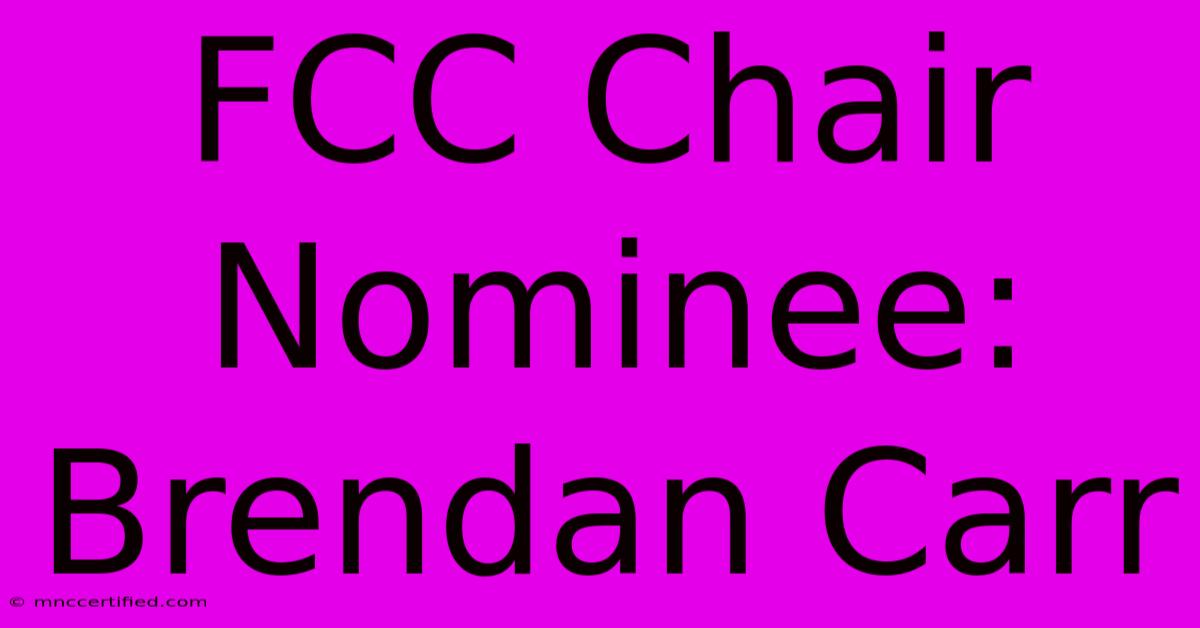FCC Chair Nominee: Brendan Carr

Table of Contents
FCC Chair Nominee: Brendan Carr – A Deep Dive into His Record and Potential Impact
Brendan Carr's nomination to the Federal Communications Commission (FCC) has sparked significant debate. Understanding his background, policy stances, and potential impact on the future of telecommunications is crucial. This article provides a comprehensive overview, analyzing his past actions and offering insights into what his potential chairmanship might entail.
Brendan Carr: Background and Career
Before his involvement with the FCC, Carr held various positions in the legal and political arenas. He served as Chief Counsel for the Senate Commerce Committee and gained valuable experience navigating complex regulatory landscapes. This experience shaped his approach to telecommunications policy, influencing his views on issues such as net neutrality, media ownership, and the expansion of broadband access. His legal background provides a strong foundation for his understanding of the intricacies of FCC regulations. He is known for his conservative approach to regulation, often advocating for a lighter touch than some of his predecessors.
Key Policy Positions and Voting Record
Carr's voting record at the FCC reveals a consistent pattern. He has consistently voted against policies perceived as favoring increased government regulation, often siding with Republican colleagues. Some of his key policy positions include:
-
Net Neutrality: Carr has been a vocal opponent of strong net neutrality rules, arguing that they stifle innovation and investment in broadband infrastructure. His stance aligns with the belief that a free market approach is best suited for managing internet traffic. His votes reflect this belief, consistently opposing measures aimed at preventing internet service providers from prioritizing certain types of traffic.
-
5G Deployment: He has strongly supported policies aimed at accelerating the deployment of 5G technology, advocating for streamlining the regulatory process to facilitate faster infrastructure development. This focus reflects a prioritization of technological advancement and economic growth. He sees efficient 5G deployment as crucial for future technological innovation and competitiveness.
-
Media Ownership: Carr's views on media ownership regulations are generally considered less interventionist than those of some other commissioners. He often supports policies that allow for greater consolidation within the media industry, arguing that it fosters efficiency and competition. His perspective on this issue has faced criticism from those who worry about the implications for media diversity and local news coverage.
-
Broadband Access: While advocating for less regulation in some areas, Carr also acknowledges the importance of expanding broadband access to underserved communities. He has supported initiatives aimed at bridging the digital divide, though his approaches to achieving this goal often favor market-based solutions rather than significant government subsidies.
Potential Impact as FCC Chair
If confirmed as FCC Chair, Carr's influence on the future of telecommunications in the United States would be substantial. His conservative approach suggests a potential shift towards less regulation across various sectors. This could lead to:
- Increased deregulation of internet service providers, potentially leading to concerns about net neutrality and the fairness of internet access.
- Accelerated 5G deployment, driving economic growth and technological advancements, but also potentially raising concerns about the environmental impact and potential health effects of increased wireless infrastructure.
- Further consolidation within the media industry, with potential implications for media diversity and local news coverage.
- A focus on market-based solutions for expanding broadband access, which might leave some underserved communities behind without significant government intervention.
Criticisms and Controversies
Carr's tenure on the FCC has not been without controversy. He has faced criticism for his stance on net neutrality, with opponents arguing that his views threaten the open internet. His support for policies that potentially lead to increased media consolidation has also drawn scrutiny. Understanding these criticisms is crucial for a complete assessment of his record.
Conclusion: A Pivotal Role in Shaping the Future of Telecommunications
Brendan Carr's nomination to the FCC chairmanship is significant. His past actions and policy positions offer clear insight into his likely approach to regulating the telecommunications industry. His conservative stance on regulation will undoubtedly shape the landscape of internet access, 5G deployment, and media ownership in the years to come. A thorough understanding of his record is essential for anyone following the evolution of U.S. telecommunications policy.
Keywords: Brendan Carr, FCC, Federal Communications Commission, FCC Chair, Net Neutrality, 5G, Broadband Access, Media Ownership, Telecommunications, Regulatory Reform, Conservative Policy, Senate Commerce Committee, Digital Divide, Telecommunications Policy
Note: This article provides an overview and analysis. For detailed information, consult official FCC documents and news reports. This content is for informational purposes only and does not constitute legal or policy advice.

Thank you for visiting our website wich cover about FCC Chair Nominee: Brendan Carr. We hope the information provided has been useful to you. Feel free to contact us if you have any questions or need further assistance. See you next time and dont miss to bookmark.
Featured Posts
-
Your Cny Thanksgiving 2024 Guide
Nov 19, 2024
-
Dune Prophecy Episode 1 Easter Eggs
Nov 19, 2024
-
Mewis And Kerr Expect First Child
Nov 19, 2024
-
Dune Prophecy Review Sci Fis New Face
Nov 19, 2024
-
Bernard On Holding Kelce Low Game
Nov 19, 2024